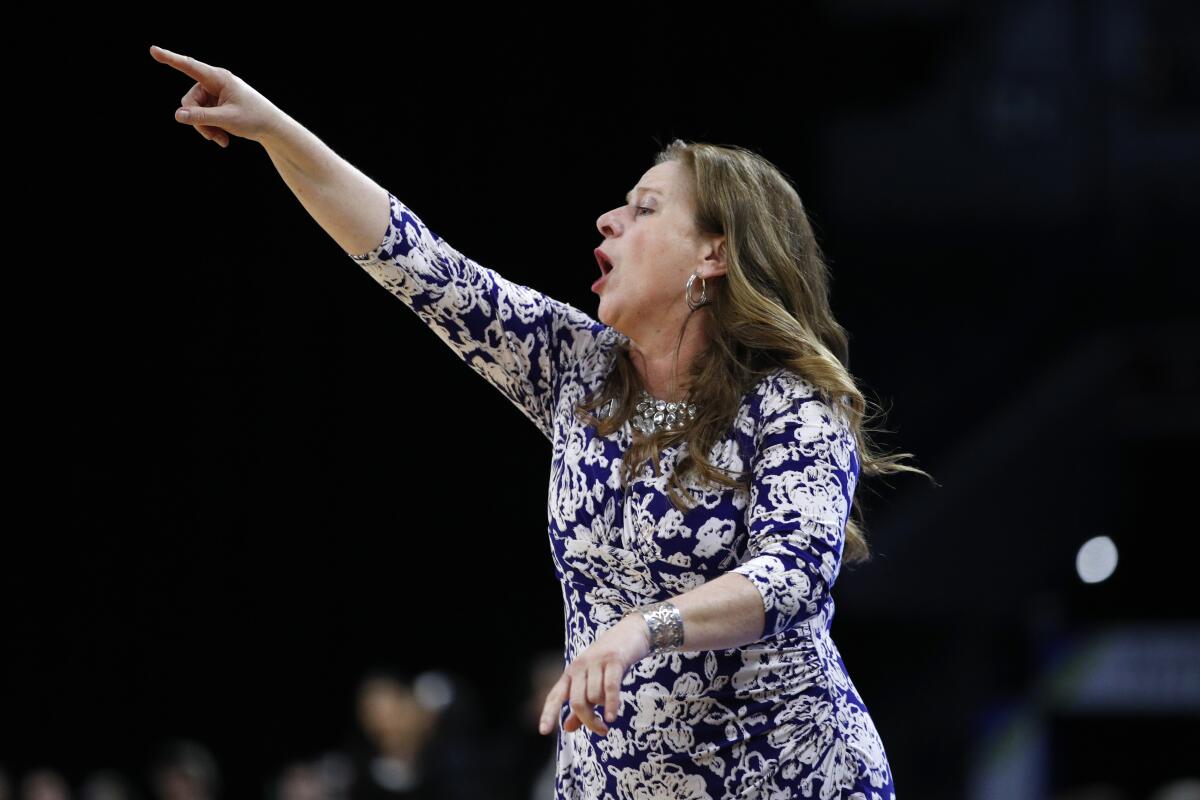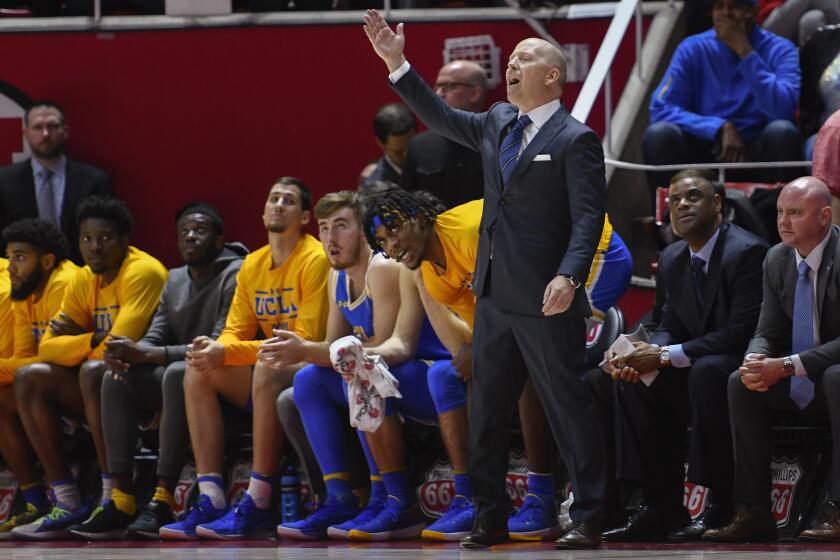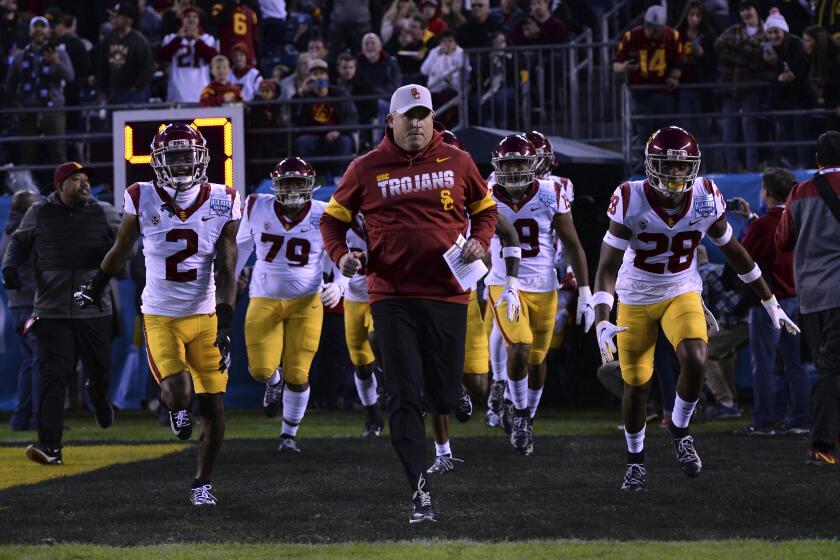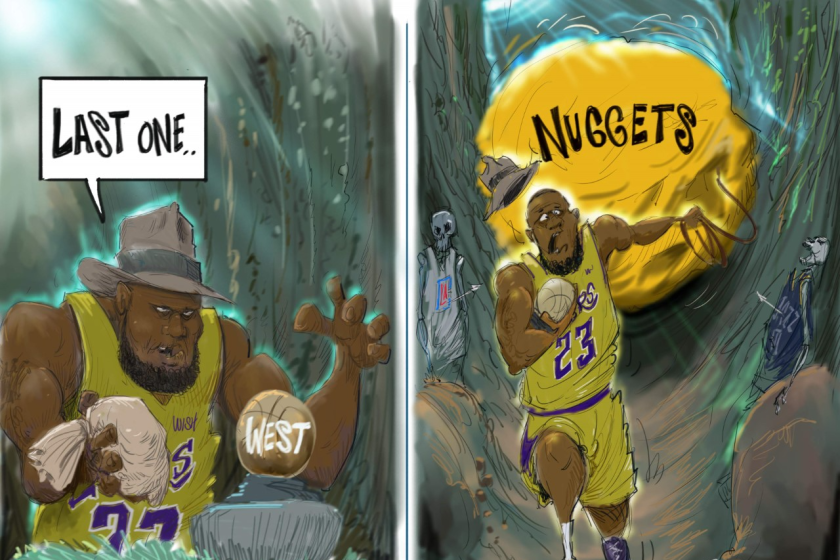Pac-12 basketball teams have work to do finding and preparing for games

- Share via
Two months before the first game of the season, Cori Close is already in a March Madness mood.
Call this version the September Shuffle.
After the Pac-12 Conference gave them the green light Thursday to resume competition this year, basketball programs are scrambling to reset their nonconference schedules. It’s “mayhem,” Close said, not unlike the turnaround after an NCAA tournament selection show when teams frantically plan flights, hotels and scouting reports within hours of learning the matchups.
Nonconference slates are usually meticulously completed two to three years in advance.
Everything remains in flux for coach Mick Cronin and UCLA basketball a day after the Pac-12 Conference cleared teams to play as soon as Nov. 25.
“Now we are going to throw it all up in the air and try to do it in three weeks,” Close said. “I think it’s going to be very challenging, but it’s also a little bit of an adrenaline rush, like, ‘Let’s go. We got something to shoot for.’ ”
After thinking they wouldn’t start competition until 2021 because of the Pac-12’s COVID-19 plan, football, basketball and other winter sports, including gymnastics and swimming and diving, are now allowed to return this year. The NCAA allows basketball teams to start Nov. 25, with preseason practices beginning Oct. 14. USC and UCLA must also clear local public health guidelines before practicing fully by that date.
With the season delayed, the NCAA Division I council announced changes to the minimum and maximum amount of games allowed for tournament eligibility. Men’s teams can schedule up to 24 regular-season games with an additional multi-team tournament of up to three games, 25 games and one two-game tournament, or 25 games with no tournament.
The Pac-12 was planning an expanded 20-game men’s basketball conference schedule, leaving up to seven nonconference games available. UCLA men’s coach Mick Cronin said he did not envision the conference slate changing, but one idea that’s been floated is to add a makeup week to the end of the schedule in case any games have to be postponed.
Women’s teams can have up to 23 regular-season games with one tournament of up to four games or 25 regular-season games without a tournament. Teams need to play at least 13 games against Division I opponents to be considered for the NCAA tournament, which is half as many as in previous years.
The USC women’s team, which lost an opportunity for its young team to compete in the WNIT last year, had hopes to host Kansas this season. The Trojans are also scheduled to participate in the Cancun Challenge, which has already been moved to Melbourne, Fla., against key nonconference opponents such as Tennessee and Florida State.
Here are five questions facing USC as the Trojans prepare to start a delayed and shortened college football season.
The Division I basketball committees recommended that teams play a minimum of four nonconference games. In the scheduling scramble, maintaining a competitive schedule with Power Five opponents remains a hope, but not a guarantee as conferences have differing guidelines.
“You’re basically limited in what you want to do as far as the schedule,” USC women’s basketball coach Mark Trakh said. “The main thing is to try to get the games scheduled and locked in to play them more than who we’re going to play.”
For UCLA and USC, it might mean staying local. The only given on the schedule for the UCLA men is that the Bruins will play San Diego as part of a previous agreement between the teams. The Bruins could add other nonconference games against California opponents given several geographic advantages.
“You can do neutral sites, you can get to each other a lot easier, a lot safer, without people having to get on airplanes,” Cronin said. “So the phone lines to all the California schools are open.”
Letters from readers to the Los Angeles Times Sports department.
Cronin keeps track of it all on what he calls his “Big Board of Possibilities.” The whiteboard tracks potential teams, dates and locations for nonconference games.
Harvard is already out because the Ivy League isn’t playing this fall. Marquette might back out of its game originally scheduled for December in Pauley Pavilion because the Big East is adding two games to its conference schedule. Georgetown has pulled out of the Wooden Legacy because of travel restrictions, leaving that four-team tournament also involving UCLA in limbo. The CBS Sports Classic, in which the Bruins were scheduled to play Kentucky in Brooklyn, N.Y., could move to the Midwest, Cronin said.
The coach contemplated the challenges not with a sigh but a smile.
“The logistics of scheduling right now is an official nightmare, but it’s a good one. We’re all happy we’re doing it,” Cronin said, alluding to the certainty of having a season. “It’s like a Disney movie, like I’m driving down Sepulveda whistling.”
Times staff writer Ben Bolch contributed to this story.
More to Read
Go beyond the scoreboard
Get the latest on L.A.'s teams in the daily Sports Report newsletter.
You may occasionally receive promotional content from the Los Angeles Times.














